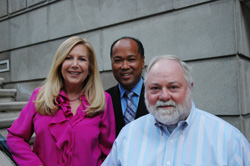Stepping Up for the Underserved: Lawyers' Pro Bono Is Key to Providing Equal Access to Justice

Laurel Bellows with (center) Benes Z. Aldana, chair of the Solo, Small Firm and General Practice Division; and Martin Lybecker, chair of the Section of Business Law. The two entities are engaged in exciting pro bono initiatives. Photo by Julie Brown.
The perfect storm. That is how my friend Larry McDevitt, chair of the ABA Standing Committee on Pro Bono and Public Service, describes the widening gap in our justice system. At a time when money for legal aid continues to dwindle and more Americans fall into poverty, the need for pro bono legal assistance is accelerating into a full-blown crisis.
The number of Americans living in poverty is at an all-time high. The Legal Services Corp. says more than 80 percent of the civil legal needs of low-income Americans are not being met, a shameful gap that has not shrunk since cuts began in 1981. Worse, the 80 percent gap in coverage does not include the legal needs of anyone earning more than $23,000—85 percent of Americans.
No matter the person, policy or problem, lawyers are unique in our capacity and willingness to provide legal solutions and access to justice. As a board member and pro bono volunteer over the last 20 years at the Women’s Business Development Center in Chicago, I have seen how a lawyer’s advice and expertise can change lives—assisting a woman fighting discrimination in the workplace, representing female entrepreneurs as they start their own businesses, or holding governments accountable for failing to honor affirmative action practices.
If every practicing lawyer changed one life per year, imagine how much closer to achieving the American dream we could be.
The ABA is proud of our lawyers. Despite tremendous economic pain in our profession, an association study found that nearly 75 percent of attorneys provide free legal services to the underserved or to organizations that help those in need.
The immigration policy instituted by President Barack Obama allows illegal immigrants who arrived as children to defer deportations for two years and work legally in the country they call home. On Aug. 15, volunteer lawyers stood ready to assist thousands of young people who lined up across America to make their dream a reality—working and living legally in the United States.
When Hurricane Isaac struck the Gulf Coast, flooding communities and destroying homes and livelihoods, volunteer lawyers put their experience to work helping victims with landlord-tenant matters, insurance claims and other legal issues.
Lawyers are helping members of our military. When a U.S. Marine saw errors on his credit report that could prevent him from getting the security clearance he needed to re-enlist, a volunteer lawyer discovered that the Marine was a victim of identity theft and worked with lenders to clear his name.
Recently, hundreds of law firms, bar associations, courts and law schools participated in the fourth annual National Pro Bono Celebration—offering legal clinics, recognizing volunteers, and conducting public service training and activities. This important gathering, begun by the ABA Standing Committee on Pro Bono and Public Service, acknowledges the increasing need for pro bono services during these challenging economic times and celebrates the outstanding response of attorneys to this crisis.
We honor those ABA members who participate in pro bono work. Plus, we have the resources to guide those considering how to volunteer. The National Pro Bono Volunteer Opportunities Guide, at abaprobono.org, provides a state-by-state searchable list of organizations.
Bar associations in your community, as well as pro bono and legal service organizations, offer opportunities that match your interests, often providing mentors, free training, malpractice coverage and prescreening of clients. These support services are of particular value to small-firm and solo practitioners.
Lawyers are the trustees of our justice system. As leaders, we must use our training, talent and resources to fulfill the promise of equal access to justice.
Lewis Powell Jr., past president of the American Bar Association and former Supreme Court justice, wisely said, “Equal justice under law is not merely a caption on the facade of the Supreme Court building; it is perhaps the most inspiring ideal of our society. It is one of the ends for which our entire legal system exists. … It is fundamental that justice should be the same, in substance and availability, without regard to economic status.”



